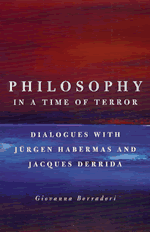Philosophy in a Time of Terror
Giovanna Borradori conceived Philosophy in a Time of Terror: Dialogues with Jürgen Habermas and Jacques Derrida shortly following the attacks on September 11, 2001; through it, he was able engage in separate interviews with two of the most profound—and mutually antagonistic—philosophers of the era. The work they labor here unravels the social and political rhetoric surrounding the nature of “the event,” examines the contexts of good versus evil, and considers the repercussions such acts of terror levy against our assessment of humanity’s potential for vulnerability and dismissal. All of this, of course, prescient and relevant to ongoing matters today.
Below follows an excerpt published on Berfrois. In it, Jacques Derrida responds to one of Borradori’s questions, which asked if the initial impression of US citizens to 9/11, “as a major event, one of the most important historical events we will witness in our lifetime, especially for those of us who never lived through a world war,” was testifiable:
Whether this “impression” is justified or not, it is in itself an event, let us never forget it, especially when it is, though in quite different ways, a properly global effect. The “impression” cannot be dissociated from all the affects, interpretations, and rhetoric that have at once reflected, communicated, and “globalized” it from everything that also and first of all formed, produced, and made it possible. The “impression” thus resembles “the very thing” that produced it. Even if the so-called “thing” cannot be reduced to it. Even if, therefore, the event itself cannot be reduced to it. The event is made up of the “thing” itself (that which happens or comes) and the impression (itself at once “spontaneous” and “controlled”) that is given, left, or made by the so-called “thing.” We could say that the impression is “informed,” in both senses of the word: a predominant system gave it form, and this form then gets run through an organized information machine (language, communication, rhetoric, image, media, and so on). This informational apparatus is from the very outset political, technical, economic. But we can and, I believe, must (and this duty is at once philosophical and political) distinguish between the supposedly brute fact, the “impression,” and the interpretation. It is of course just about impossible, I realize, to distinguish the “brute” fact from the system that produces the “information” about it. But it is necessary to push the analysis as far as possible. To produce a “major event,” it is, sad to say, not enough, and this has been true for some time now, to cause the deaths of some four thousand people, and especially “civilians,” in just a few seconds by means of so-called advanced technology. Many examples could be given from the world wars (for you specified that this event appears even more important to those who “have never lived through a world war”) but also from after these wars, examples of quasi-instantaneous mass murders that were not recorded, interpreted, felt, and presented as “major events.” They did not give the “impression,” at least not to everyone, of being unforgettable catastrophes.
We must thus ask why this is the case and distinguish between two “impressions.” On the one hand, compassion for the victims and indignation over the killings; our sadness and condemnation should be without limits, unconditional, unimpeachable; they are responding to an undeniable “event,” beyond all simulacra and all possible virtualization; they respond with what might be called the heart and they go straight to the heart of the event. On the other hand, the interpreted, interpretative, informed impression, the conditional evaluation that makes us believe that this is a “major event.” Belief, the phenomenon of credit and of accreditation, constitutes an essential dimension of the evaluation, of the dating, indeed, of the compulsive inflation of which we’ve been speaking. By distinguishing impression from belief, I continue to make as if I were privileging this language of English empiricism, which we would be wrong to resist here. All the philosophical questions remain open, unless they are opening up again in a perhaps new and original way: what is an impression? What is a belief? But especially: what is an event worthy of this name? And a “major” event, that is, one that is actually more of an “event,” more actually an “event,” than ever? An event that would bear witness, in an exemplary or hyperbolic fashion, to the very essence of an event or even to an event beyond essence? For could an event that still conforms to an essence, to a law or to a truth, indeed to a concept of the event, ever be a major event? A major event should be so unforeseeable and irruptive that it disturbs even the horizon of the concept or essence on the basis of which we believe we recognize an event as such. That is why all the “philosophical” questions remain open, perhaps even beyond philosophy itself, as soon as it is a matter of thinking the event.
Read more about Philosophy in a Time of Terror here.
